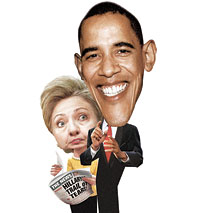 |
Illustration by Darrow
|
The day after the notably down-and-dirty Nevada caucuses, I asked Hillary Clinton if, on occasion, her campaign had been wont to play the game a tad too rough. Now and then, Clinton allowed—then quickly pivoted and trained her fire on Barack Obama’s operation. She argued that his campaign had incited racial animus by playing up her remarks about Lyndon Johnson and Martin Luther King. That it had made “what I thought was a breathtaking charge that I was in some way responsible for Benazir Bhutto’s assassination.” That it had “basically condoned a really mean-spirited” Spanish-language ad in Nevada that asserted Hillary “does not respect our people.” Without pausing to catch her breath, Clinton concluded, “There’s no outcry. There’s no drumbeat. And so I accept that I will always be under a higher level of scrutiny; it goes with the territory.”
The scrutiny Clinton was talking about was media scrutiny, of course. So I asked if she agreed with her husband’s loudly voiced view that there was a double standard inherent in the coverage of her and Obama. “I don’t go there,” she replied, waving one hand in the air. “Certainly, a lot of my supporters express their feelings about it. But I just don’t think about that because it’s not a useful thing for me to think about.”
Whether Clinton is actually so Zen-like about this topic—and, really, who would be?—her adjutants are adamantly not. Instead, for the better part of a year, they have complained to any reporter who would listen about what they regard as a manifest pro-Obama, anti-Hillary tilt in the press corps. With the contretemps over David Shuster’s “pimped out” comments about Chelsea Clinton, this line of argument has become more heated, to be sure, especially as it pertains to NBC and MSNBC. (“A horror show” is how one Clinton adviser describes her nightly treatment by Chris Matthews, Tim Russert, and even Brian Williams.) But it’s connected to a long-simmering sense of grievance that’s deeper and more subtle.
That the campaign exaggerates its degree of outrage, and Hillary her victimhood, in order to gain a tactical advantage is obvious. But that doesn’t mean their critique is meritless—quite the contrary. The more interesting question, however, is what role each campaign has had in fostering a media dynamic that has clearly favored Obama and plainly damaged Clinton. And also whether that dynamic will come back to bite Obama if he’s the Democratic nominee.
It’s worth pointing out, to begin with, that the Clinton forces are hardly alone in noting the disparity. “Both of them have gotten an enormous amount of play,” says Marion Just, a political scientist at Wellesley who has made a systematic study of the coverage of the race. “But the coverage of Hillary has been primarily negative, while the coverage of Obama has been so positive that you have to call him, though I really hate this term, a media darling.”
Divergence in tone is one thing, double standards are another. And it’s the latter that most galls the former advisers to the other, now-departed, Democratic candidates. “Obama has been able to get away with a stunning amount of hypocrisy that would get called on her,” says one such operative. “They’ve run the nastiest, most deceptive pieces of paid media: the mailer they did lying about her health-care plan, with the Harry and Louise look-alikes. The idea that it took Hillary growling Tony Rezko’s name in a debate to get any national coverage. How he complained in Iowa about 527s and then had them supporting him like crazy in Nevada and California. And nobody says a peep about it. It’s fucking comical!”
There are countless other examples of this syndrome, both large and small. The way that Clinton’s famous fumbling of a question about whether illegal immigrants should be allowed to have driver’s licenses in a debate last fall was hammered on for weeks—whereas Obama’s flubbing of the same question in the next debate was essentially let slide. The way that Obama’s evisceration of his rival in his stump speeches was applauded by the media—whereas Clinton’s plunge into negative territory was widely condemned. The way that Clinton was roundly criticized for being inaccessible, and thus unaccountable, to the press—when Obama has since January been even less available for questioning than she.
Theories abound as to why the media has treated Clinton and Obama so differently. The simplest is that reporters simply like Obama better; that he’s new and fresh and unburdened with anything resembling Clinton fatigue. Another theory revolves around cultural bias. “The fact is that the national press is a bunch of northeastern liberals,” says the adviser to an erstwhile Democratic runner, “and they just love the idea of this post-racial black dude being the nominee.” A third revolves around the respective dramatic arcs embodied by Clinton and Obama. Citing the Times primary-beat reporters assigned to the candidates, a competitor of theirs observes, “Pat Healy’s job is to challenge the Clinton myth and machine. Jeff Zeleny’s is to write the epic rise of Barack Obama. That’s generally the media’s approach—Clinton and Obama are just at different points in their stories.”